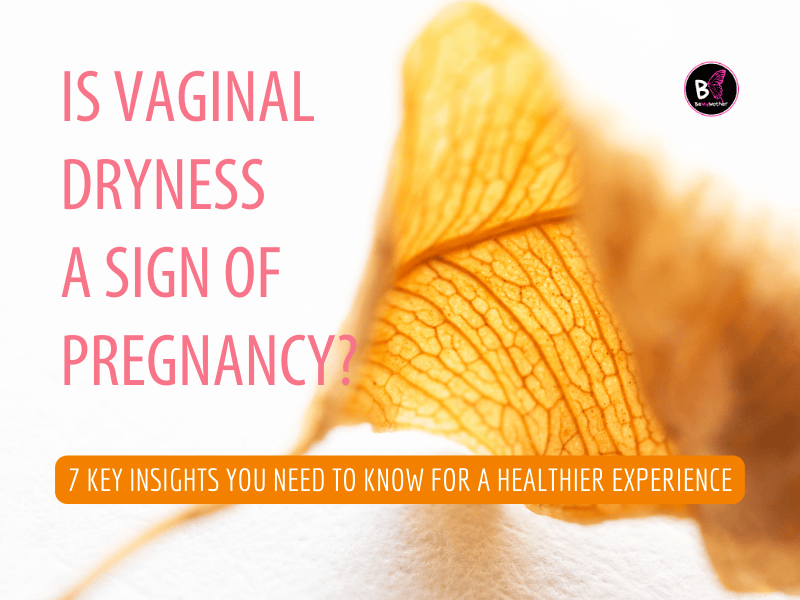Vaginal dryness is a common concern for many women, especially those who are pregnant or trying to conceive. It can be an uncomfortable, confusing symptom to navigate, leaving you wondering, Is vaginal dryness a sign of pregnancy? While a variety of factors can cause this symptom, pregnancy-related hormonal changes can sometimes make vaginal moisture fluctuate. In this blog, we will explore the causes of vaginal dryness, its connection to pregnancy, and what you can do to manage it. Plus, we’ll debunk some myths and provide evidence-based insights to help you understand what’s happening with your body.
Is Vaginal Dryness A Sign of Pregnancy?
The short answer is: Vaginal dryness can occur during pregnancy, but it is not a primary or reliable sign of pregnancy. Many women experience increased vaginal discharge as a result of hormonal changes, particularly during early pregnancy. However, a lack of moisture in the vaginal area can also be a sign of other factors, such as stress, certain medications, or hormonal imbalances that are not related to pregnancy.
The American College of Obstetricians and Gynecologists (ACOG) explains that estrogen plays a critical role in maintaining vaginal lubrication. During pregnancy, hormonal shifts can temporarily decrease estrogen, leading to dryness.

Why Does Vaginal Dryness Occur During Pregnancy?
During pregnancy, hormonal fluctuations, particularly in estrogen and progesterone, can affect vaginal health. In early pregnancy, lower estrogen levels can reduce vaginal lubrication, leading to a feeling of dryness. It is important to note that these hormonal shifts impact women differently, and some women may experience no dryness at all.
Moreover, pregnancy-related fatigue and stress can also contribute to changes in vaginal moisture levels. While dryness can occur in some women, many others experience increased vaginal discharge, which is more common and typical during pregnancy.
| Pregnancy and Vaginal Dryness: Key Factors | Symptoms | Effect on Vaginal Health |
| Hormonal fluctuations (estrogen and progesterone) | Mild dryness | Lower estrogen levels may result in reduced moisture production |
| Early pregnancy (first trimester) | Increased or decreased vaginal discharge | Hormonal changes during early pregnancy can affect moisture levels |
| Stress and fatigue | Possible vaginal dryness or irritation | Stress can affect overall body functions, including lubrication |
While vaginal dryness may occur during pregnancy, it’s not a definitive sign. However, maintaining a balanced diet with nutrients like collagen can support skin and tissue health during this time. Is Collagen Safe During Pregnancy? 8 Surprising Facts You Can’t Afford to Miss explores how collagen affects pregnancy wellness.
What Causes Vaginal Dryness?
What Are The Causes of Vaginal Dryness?
Vaginal dryness occurs when there is insufficient moisture in the vaginal tissues, leading to discomfort, irritation, and even pain during intercourse. This condition has various causes, and it is essential to understand what might be at play in your specific case.
The Cleveland Clinic highlights that certain medications, such as antihistamines and antidepressants, can cause dryness by reducing mucus production, including in the vaginal tissues.
Common Causes of Vaginal Dryness:
- Hormonal Changes: Estrogen is a key hormone responsible for vaginal moisture. Low estrogen levels, especially during menopause, pregnancy, or postpartum, can lead to dryness.
- Medications: Certain medications, like antihistamines, antidepressants, and birth control pills, can reduce lubrication.
- Health Conditions: Autoimmune diseases, diabetes, and other chronic conditions can also affect vaginal moisture.
- Lifestyle Factors: Smoking, dehydration, and stress are lifestyle factors that may exacerbate dryness.
Vaginal Dryness and Sex: How to Manage It
Sexual intercourse can become painful when vaginal dryness is present. The lack of natural lubrication can lead to friction and discomfort during sex, which may affect a woman’s quality of life and intimacy.
Managing Vaginal Dryness During Sex:
One of the easiest ways to relieve discomfort during sex is to use a lubricant. Many types of lubricants are available, but it is important to choose one compatible with your body. Water-based lubricants are often recommended for those experiencing vaginal dryness.
| Types of Lubricants | Benefits | Considerations |
| Water-based | Safe for sensitive skin, easy to clean, widely available | May dry out more quickly; reapply as needed |
| Silicone-based | Longer-lasting, great for water activities | Can be harder to clean and may irritate some women |
| Oil-based | Longer-lasting, ideal for soothing irritated tissues | Not recommended for use with condoms, as it can cause irritation |
Vaginal Dryness During Pregnancy and After Giving Birth

Pregnancy and childbirth are times of significant hormonal shifts, and both can lead to changes in vaginal moisture.
Vaginal Dryness During Pregnancy:
As mentioned, early pregnancy may cause a reduction in vaginal lubrication due to hormonal fluctuations. However, in the later stages of pregnancy, some women experience increased vaginal discharge due to higher estrogen levels.
Vaginal Dryness After Giving Birth:
After childbirth, many women experience vaginal dryness, particularly during breastfeeding. This is primarily due to lower estrogen levels associated with lactation. While breastfeeding, estrogen levels may remain lower, leading to vaginal dryness that can last for several months.
Postpartum recovery often includes navigating hormonal shifts, which can cause vaginal dryness. For insights into managing pregnancy-related dental care challenges, explore Can You Get a Tooth Pulled During Pregnancy? 9 Essential Facts for a Safer, Healthier Pregnancy.
Menopause-Related Vaginal Dryness: Causes and Solutions
Menopause is another life stage where vaginal dryness is a common concern. As estrogen levels decrease, vaginal tissues may lose moisture, leading to dryness, irritation, and discomfort.
A review in the North American Menopause Society Journal states that nearly 50% of postmenopausal women experience vaginal atrophy due to estrogen deficiency, leading to symptoms like dryness and irritation.
Managing Vaginal Dryness During Menopause:
For postmenopausal women, vaginal dryness may persist. There are treatments available, including vaginal moisturizers, lubricants, and hormone replacement therapy (HRT), which can help alleviate the discomfort caused by dryness.
| Menopause and Vaginal Dryness | Solutions | Effectiveness |
| Hormonal changes (reduced estrogen) | Vaginal moisturizers, lubricants | Temporary relief for dryness and discomfort |
| Low estrogen levels | Hormone replacement therapy (HRT) | Effective in restoring vaginal moisture for many women |
| Atrophic vaginitis | Vaginal estrogen therapy | Helps restore vaginal health and moisture |
Treatment and Remedies for Vaginal Dryness: Dos and Don’ts
When managing vaginal dryness, it is essential to adopt healthy habits and avoid things that may worsen the condition. Below is a guide on what to do and what to avoid:
Dos:
- Use a water-based lubricant during sex to reduce friction.
- Stay hydrated to support overall body moisture.
- Use a vaginal moisturizer if you experience dryness that persists.
- Consider HRT or vaginal estrogen therapy if recommended by a healthcare provider.
Don’ts:
- Avoid using scented soaps, sprays, or douches, as they can irritate the vaginal area.
- Don’t smoke, as smoking can reduce estrogen levels and worsen vaginal dryness.
- Avoid tight clothing that can irritate the vaginal area and cause friction.
The American Academy of Family Physicians (AAFP) recommends water-based lubricants and silicone-based products as safe and effective options for vaginal dryness during pregnancy.
When to See a Doctor About Vaginal Dryness
While occasional vaginal dryness is common, persistent or painful dryness may require medical attention. If your symptoms do not improve with over-the-counter remedies or if they interfere with your daily life or sexual activity, it’s important to consult with a healthcare provider.
The Mayo Clinic advises consulting a healthcare provider for vaginal dryness accompanied by pain, itching, or abnormal discharge, as these may indicate underlying issues.
If you’re preparing for pregnancy and experiencing vaginal dryness, it might be a good time to evaluate your overall reproductive health. Vitanica Pregnancy Prep: 9 Shocking Things You Need to Know Before Trying to Conceive offers tips for optimizing your body for conception
FAQs About Vaginal Dryness
- What Does Vaginal Dryness Feel Like? Vaginal dryness may feel like a lack of moisture or discomfort, especially during sex. It can lead to itching, burning, or soreness in the vaginal area.
- Can Vaginal Dryness Be a Sign of Pregnancy? Vaginal dryness can occur during pregnancy, but it is not a reliable sign. Pregnancy is more commonly associated with increased vaginal discharge due to hormonal changes.
- Does Vaginal Dryness Go Away After Menopause? Vaginal dryness typically does not go away after menopause unless treated with interventions like vaginal moisturizers or hormone replacement therapy (HRT).
- Is Vaginal Dryness a Sign of a Period Coming? Vaginal dryness can sometimes occur before menstruation due to hormonal fluctuations, but it is not a consistent or primary sign of an impending period.
- Why Am I Suddenly Dry Down There? Sudden vaginal dryness can be caused by hormonal changes, medications, stress, or health conditions. If it persists, consult a healthcare provider.
- Are You Dry or Wet in Early Pregnancy? Early pregnancy can result in both increased vaginal discharge and, in some cases, dryness. Each woman’s experience can vary due to hormonal changes.
Conclusion
Is vaginal dryness a sign of pregnancy? While it can occur due to hormonal changes during pregnancy, it is not a definitive sign of pregnancy. Many factors, including stress, medications, menopause, and childbirth, can influence vaginal dryness. However, understanding the causes and managing the symptoms can relieve and improve your comfort. Always consult with your healthcare provider if you have concerns about vaginal dryness or any other symptoms, especially if they are persistent or affecting your daily life.
By addressing the potential causes of vaginal dryness and offering solutions, this article hopes to ease your concerns and help you navigate this often misunderstood symptom. If you’re ever uncertain about the causes of your symptoms, seeking professional guidance is always the best course of action.



